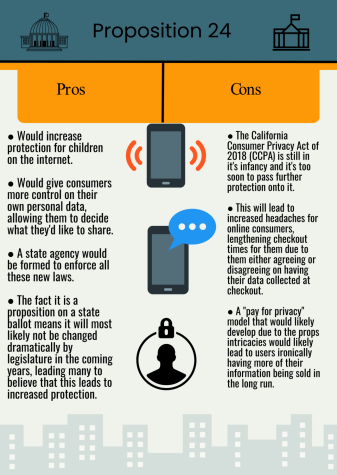
Prop 24: An extension of the CCPA or something more?
To say that Proposition 24 is a head scratcher would be an understatement.
In its 52 pages of information, it’s easy to get lost in what exactly the proposition’s goals are. The length and lack of clarity lead to heavy confusion.

The proposition aims to essentially finish the work that the California Consumer Privacy Act of 2018 (CCPA) began two years ago, and better protect consumer data privacy in California. This data consists of things such as the users location, health, age, and gender. It all depends on what the website you’re visiting deems as useful (or profitable) information to gather from you.
It’d do this by creating a state agency which would enforce the laws that it would bring about, and hold businesses who do not follow them accountable.
It’s supporters usually note that the the CCPA of 2018 did not do enough to protect user’s privacy, and that they did not notice a difference when it came to their online presence.
Another pro of the prop is the fact that the increased security benefits children as well, as it will allow the government to charge upwards to $7,500 if they violate children’s privacy. This has led to many groups such as Common Sense Media, who are huge advocates of child safety when it comes to consuming media, to support the prop.
It’s detractors argue that rather than protect your information online, the proposition would in fact have the opposite effect. It’s argued that it’s “pay for privacy” model would allow for businesses to gain a larger amount of information on it’s user bases long term and allow them to do so without being caught or questioned.
Others argue that the CCPA is still in its infancy and has not had enough time to take effect. They believe that further complicating the matter and not allowing it time to develop over time will lead it to fail.
It’s main supporter is Alastair Mactaggart, a San Francisco real estate developer who firmly believes that users should be in control of their private online data. He’s funded the proposition almost single handedly, donating about $6,000,000 to the cause. He also headed the CCPA in 2018.
Groups that oppose the proposition vary. The American Civil Liberties Union (ACLU) opposes it. Many news publications oppose the proposition as well. These include the San Francisco Chronicle, Orange County Register, San Bernardino Sun, and Los Angeles Daily News.
Many of these publications cite that many of the details buried in its lengthy 52 page would be detrimental to the public if the proposition were to pass.
We here at Talon Marks are divided on the proposition, and wished to present a clear and concise summary of what the prop entails.